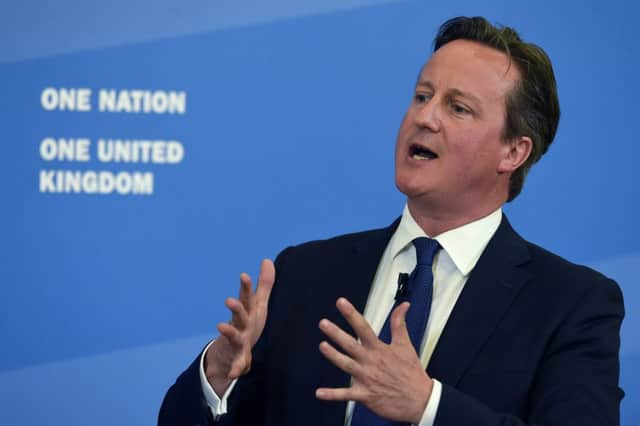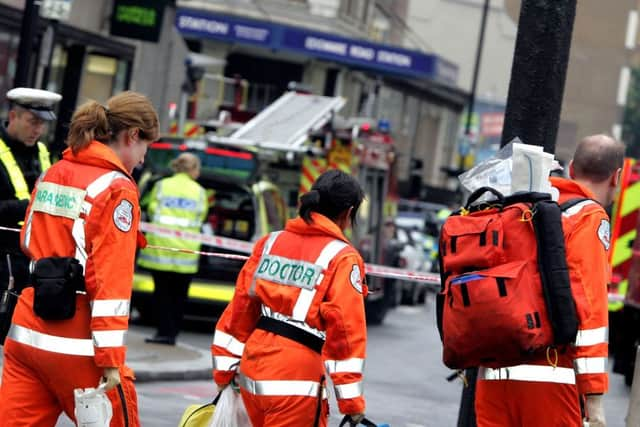Allan Massie: Act with care in war of extremes


It’s important not to exaggerate. In the ten years since the London Tube bombings there has been no comparable terrorist atrocity here in Britain. A good many terrorist plots of varying degrees of seriousness have been prevented by the police and security services. Arrests have been made, trials held, and conspirators jailed, but the horrible murder of the off-duty soldier Lee Rigby is the only terrorist “success” since 2005. In comparison with the Provisional IRA, who exploded a bomb in the Brighton Hotel where the Prime Minister and other leading members of the Conservative Party were staying, the Islamists, whether affiliated to al-Qaeda or Islamic State (IS), have been quite remarkably ineffective in Britain.
Much has been made of the number of young British Muslims who have been “radicalised” and made their way to Syria or Iraq to join IS. Nobody knows exactly how many may have done so, but estimates are usually in the hundreds rather than thousands. Fears have been expressed about what these jihadists may do when – if? – they return, and no doubt in a few cases such fears may be reasonable. It is, however, pertinent to point out that there are many hundreds of thousands of young British Muslims in their late teens and early twenties who, far from being influenced by extremist preachers or websites, are well integrated in society and engaged in pursuing their studies or careers. Being a devout and practising Muslim doesn’t prevent anyone from playing an active part in civil society.
Advertisement
Hide AdAdvertisement
Hide AdWhat percentage of the Muslim population sympathises with Islamist extremism is uncertain. Nobody indeed can know. It’s likely that any answer would depend on how the question was framed. Much the same might have been said about the attitude of Irish people living here to the IRA. Some doubtless approved the cause – the end of Partition and the unification of Ireland – but deplored the means. Once again, we must guard against exaggeration. In his wide-ranging speech this week about “the poison of extremism”, David Cameron talked about the failure of integration, a failure which left members of some communities here susceptible to Islamist propaganda .Yet the truth is that the integration of immigrant communities practising a different religion has been far more successful than anyone 50 years ago might have thought possible, let alone likely.


David Cameron spoke of the importance of what he called “British values” in “the struggle of our generation against violent Islamist extremism”. These values, fairly clearly expressed in the European Convention on Human Rights and our parliament’s Human Rights Act (which his government has threatened to amend or repeal), include tolerance of diversity and the entitlement to free speech. Both these raise questions which are not easy to answer.
The words “tolerance of diversity” may trip smoothly off the tongue, but if you insist on diversity being tolerated – and the right to this established in law – you may quickly find yourself perplexed to know how far you should tolerate the intolerant. Outlawing what society agrees to disapprove of – racism and sexism, for example – implies intolerance of opinions as well as acts. Demanding that Muslims conform to “British values” causes difficulties when the expression of these values runs counter to religious beliefs and cultural traditions. Moreover, such insistence may provoke a hostile reaction, even the alienation that you intend to discourage.
We may have sympathy for the Prime Minister when he speaks of the “poison of extremism”. Yet, even as he does so, and takes measures to combat it, his government is itself showing no respect for what many of us would consider a fundamental British – and democratic value – the right to free speech.
Last year the Home Secretary, Theresa May, spoke of her determination to “eliminate extremism in all its forms”. But you can do this only by clamping down on the expression of opinion. There have admittedly always been restrictions on this. If a speaker incites people to engage in violent acts, he or she may be charged with conduct likely to lead to a breach of the peace. This should be sufficient. The law is already in place and need only be enforced.
But, for Mrs May and this government, it seems not to be enough. The Queen’s Speech in May announced the introduction of “Extremist Disruption Orders” which may be used to silence anyone thought to be guilty of expressing “extremist” opinions. Anyone served with an EDO is forbidden to speak in public and (apparently) requires police permission to make use of Twitter.
Such a measure might be defensible if we were at war, but we are not at war. When the Prime Minister speaks of “the struggle of our generation against violent Islamist extremism”, one might reply that as struggles go, this generation has it easy. Islamism poses no threat here in Britain comparable to that posed by Nazi Germany or indeed by the Soviet Union during the Cold War. The army of IS or Daesh is not the Wehrmacht; there is no danger of nuclear war. The struggle against Islamist extremism here is essentially a matter for the police. We are at risk from criminal action, as we were from the Provisional IRA, and no more than that. Even the most horrible terrorist atrocity is not an act of war – unless we are foolish enough to regard it as such.
What happens in the Middle East and how we respond to the advance of Daesh may be difficult questions. This is almost always the case, for any action we may take there will have unforeseen and possibly unwelcome consequences. But things are not so complicated here. It is probably impossible to prevent a small number of Muslims from being radicalised and drawn to terrorism, impossible to prevent a handful from travelling to Syria or Iraq to join Daesh. This may be a tragedy for their families and friends, but it has little wider significance. The real danger for us is that in the name of defending our values, we actually take measures which damage or corrupt them.